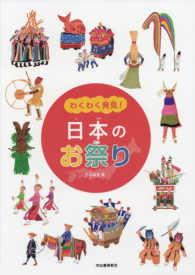- ホーム
- > 洋書
- > 英文書
- > Literary Criticism
Full Description
This is the first critical anthology of writings about memory in Renaissance England. Drawing together excerpts from more than seventy writers, poets, physicians, philosophers and preachers, and with over twenty illustrations, the anthology offers the reader a guided exploration of the arts of memory. The introduction outlines the context for the tradition of the memory arts from classical times to the Renaissance and is followed by extracts from writers on the art of memory in general, then by thematically arranged sections on rhetoric and poetry, education and science, history and philosophy, religion, and literature, featuring texts from canonical, non-canonical and little-known sources. Each excerpt is supported with notes about the author and about the text's relationship to the memory arts, and includes suggestions for further reading. The book will appeal to students of the memory arts, Renaissance literature, the history of ideas, book history and art history.
Contents
List of figures; List of tables; Acknowledgements; A note on abbreviations; Introduction; Part I. The Art of Memory: Introduction to Part I; 1.1 Stephen Hawes, The Pastime of Pleasure (1509); 1.2 [Laurence Andrewe], The Mirror of the World (1527); 1.3 Peter of Ravenna, The Phoenix (1548); 1.4 Guglielmo Gratarolo, The Castle of Memory (1562); 1.5 Hugh Plat, Jewel House of Art and Nature (1594); 1.6 William Basse, A Help to Memory and Discourse (1620); 1.7 John Willis, The Art of Memory (1621, 1661); 1.8 Henry Herdson, Ars Memoriae; the Art of Memory Made Plain (1651); 1.9 Richard Saunders, Art of Memory (1671); 1.10 Marius D'Assigny, The Art of Memory (1697); Part II. Rhetoric and Poetics: Introduction to Part II; 2.1 Anon., Table of Cebes (1531); 2.2 Thomas Wilson, The Art of Rhetoric (1553); 2.3 George Puttenham, The Art of English Poesy (1589); 2.4 Henry Peacham, The Garden of Eloquence (1593); 2.5 Philip Sidney, The Defence of Poesy (1595); 2.6 Francis Meres, Palladis Tamia (1598); 2.7 Samuel Daniel, Musophilus (1599); 2.8 Miles Sandys, Prudence (1634); 2.9 Ben Jonson, Timber, or, Discoveries (1641); 2.10 Alexander Ross, Mystagogus Poeticus (1648); Part III. Education and Science: Introduction to Part III; 3.1 Thomas Elyot, The Governor (1531); 3.2 Roger Ascham, The Schoolmaster (1570); 3.3 Levinus Lemnius, The Touchstone of Complexions (1576); 3.4 William Kempe, The Education of Children (1588); 3.5 John Brinsley, Ludus Literarius (1612); 3.6 Robert Burton, The Anatomy of Melancholy (1621); 3.7 Thomas Sprat, The History of the Royal Society (1667); 3.8 John Wilkins, An Essay Towards a Real Character (1668); 3.9 Obadiah Walker, Of Education (1673); 3.10 Robert Hooke, 'An Hypothetical Explication of Memory' (1682); Part IV. History and Philosophy: Introduction to Part IV; 4.1 Lodowick Lloyd, The Pilgrimage of Princes (1573); 4.2 William Camden, Remains Concerning Britain (1605); 4.3 Francis Bacon, The Advancement of Learning (1605); 4.4 Pierre Charron, Of Wisdom (1608); 4.5 John Weever, Ancient Funeral Monuments (1631); 4.6 Edward Reynolds, A Treatise of the Passions and Faculties (1640); 4.7 Thomas Fuller, Selected Works; 4.8 Kenelm Digby, Two Treatises (1644); 4.9 Thomas Hobbes, Leviathan (1651); 4.10 William Dugdale, Baronage of England (1675-76); Part V. Religion and Devotion: Introduction to Part V; 5.1 Thomas More, A Treatise (Unfinished) upon these Words of Holy Scripture (1522); 5.2 John Foxe, Acts and Monuments (1563); 5.3 Thomas Playfere, The Pathway to Perfection (1597); 5.4 Joseph Hall, Selected Works; 5.5 Richard Day, Book of Christian Prayers (1608); 5.6 Daniel Featley, 'Four Rows of Precious Stones' (1610); 5.7 Lewis Bayly, The Practice of Piety (1613); 5.8 John Donne, 'Sermon, preached at Lincoln's Inn' (1649); 5.9 Stephen Jerome, A Ministers Mite (1650); 5.10 E. M., Ashrae (1665); Part VI. Literature: Introduction to Part VI; Poetry; 6.1 John Skelton, 'Upon a Dead Man's Head' (1527); 6.2 Edmund Spenser, The Faerie Queen (1590); 6.3 Anthony Sherley, Wit's New Dial (1604); 6.4 Richard Niccols, Mirror for Magistrates (1610); 6.5 Abraham Holland, 'A Funeral Elegy' (1626); 6.6 George Herbert, The Temple (1633); 6.7 Francis Quarles, Emblems (1635); 6.8 Mary Fage, Fame's Rule (1637); 6.9 Margaret Cavendish, Selected Works; 6.10 John Milton, Paradise Lost (1674); Plays and prose; 6.11 Thomas Nashe, The Unfortunate Traveller (1594); 6.12 William Shakespeare, Selected Works; 6.13 John Webster, Selected Works; 6.14 Thomas Tomkis, Lingua: or the Combat of the Tongue (1607); 6.15 Mary Wroth, Urania (1621); 6.16 John Earle, Microcosmography (1628); 6.17 John Jones, Adrasta (1635); 6.18 Thomas Browne, Hydriotaphia, Urn-Burial (1658); 6.19 Anon., Crackfart and Tony; or, Knave and Fool (1680); 6.20 John Bunyan, The Pilgrim's Progress (1681); Index.





